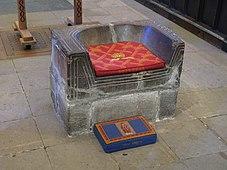Among ancient English writers, fridstoll, or frithstow, signified a seat, chair, or place of peace. The most famous surviving examples are in Beverley Minster, which has the inscription Haec sedes lapidea Freedstoll dicitur, i.e. Pacis Cathedra, ad quam reus fugiendo perveniens, omnimodam habet securitatem and in Hexham Abbey .
Also, frith-stool or frithstool, OE frithstól, frythstól, freedstool, fridstool, meaning (a). Old English only, A place of safety; a refuge; (b). A seat, usually of stone, formerly placed near the altar in some churches, which afforded inviolable protection to those who sought privilege of sanctuary.[1]
The term also signified a palace, which was usually a privileged place.
See also
- frith
- grith
- Cities of Refuge
- right of asylum
- sanctuary
- sanctuary city
References
- ^ OED Online (December 2016). "† frith-stool, n." Oxford University Press. Retrieved 7 March 2017.
 This article incorporates text from a publication now in the public domain: Chambers, Ephraim, ed. (1728). Cyclopædia, or an Universal Dictionary of Arts and Sciences (1st ed.). James and John Knapton, et al.
This article incorporates text from a publication now in the public domain: Chambers, Ephraim, ed. (1728). Cyclopædia, or an Universal Dictionary of Arts and Sciences (1st ed.). James and John Knapton, et al.
